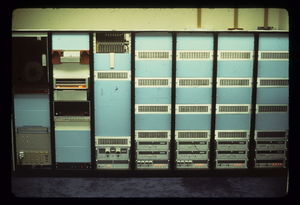Difference between revisions of "Maxc"
(→External links: Maxc files from an Alto disk.) |
(→External links: Maxc monitor sources.) |
||
| Line 29: | Line 29: | ||
** [http://www.bitsavers.org/pdf/xerox/maxc/MAXC_8.2_Spec.pdf The MAXC Microprocessor] | ** [http://www.bitsavers.org/pdf/xerox/maxc/MAXC_8.2_Spec.pdf The MAXC Microprocessor] | ||
* [http://www.softwarepreservation.org/projects/LISP/interlisp-d/Deutsch-3IJCAI.pdf A LISP Machine with Very Compact Programs], L. Peter Deutsch, 1973. | * [http://www.softwarepreservation.org/projects/LISP/interlisp-d/Deutsch-3IJCAI.pdf A LISP Machine with Very Compact Programs], L. Peter Deutsch, 1973. | ||
| + | * [https://github.com/PDP-10/maxc/tree/master/monitor Maxc monitor sources (and other files related to PUP)] | ||
* [https://xeroxalto.computerhistory.org/_cd8_/pup/.index.html Alto directory with some Maxc files], i.e. .MAC, .SAV, .REL, .UNV. | * [https://xeroxalto.computerhistory.org/_cd8_/pup/.index.html Alto directory with some Maxc files], i.e. .MAC, .SAV, .REL, .UNV. | ||
[[Category: PDP-10s]] | [[Category: PDP-10s]] | ||
Revision as of 06:01, 9 April 2022
Maxc1 and Maxc2 (often capitalized MAXC) were a pair of PDP-10 clones made at Xerox PARC, after the Xerox corporate level objected to the acquisition of machines from outside the company, instead of from Xerox's subsidiary, Xerox Data Systems - Scientific Data Systems before it was acquired by Xerox. (They chose the PDP-10 as they wanted to be able to run INTERLISP.)
They were microcoded machines, using an 72-bit microinstruction. They contained 2K words of microcode, and microinstructions executed in 200 nsec (Maxc1); 4K words, at 150 nsec (Maxc2). The hardware supported up to 16 levels of subroutine calls in the microcode. This capability was used to support bulk data transfers (from disk mass storage); a technique which was later used in the Alto.
In addition to a PDP-10-compatible mode, MAXC microcode also implemented a Byte Lisp mode with 9-bit instructions specially tailored for LISP. The INTERLISP compiler and runtime has support for this instruction set under a MAXC condition, and the MAXC monitor has special JSYS calls to facilitate Byte Lisp code.
A front end (a Data General Nova on Maxc1, and an Alto on Maxc2) was used to load and debug the microcode; all the input/output peripherals other than the disks were also connected to the front end.
The main memory was built out of then-novel DRAM chips from Intel, the new Intel 1103 1Kx1 chip. It used ECC to produce reliable memory; with a word length of 48 bits (compared to the PDP-10's native length of 36 bits; only 7 of the extra 12 bits were used for the ECC), it could correct all single-bit errors, and detect (but not correct) double-bit errors. Thus, single failed chips could be ignored, and replaced during scheduled maintenance.
They ran the TENEX operating system; to do this, Maxc implemented virtual memory mechanisms comparable to those added to the KA10 by BBN, including a 102x18 bit mapping memory.
Maxcl built during the period from February 1971 to April 1973; it was de-commissioned early in 1981. Maxc2 was built between June 1975 and April 1977.
Further reading
- Michael A. Hiltzik, Dealers of Lightning: Xerox PARC and the Dawn of the Computer Age, HarperBusiness, New York, 1999 - pp. 99-116
External links
- The Maxc Systems - good, detailed paper by Edward R. Fiala of PARC, one of the builders
- MAXC - MAXC documents at BitSavers
- Pictures - images of the machine; internals, under construction, and finished
- Maxc Operations
- The MAXC Microprocessor
- A LISP Machine with Very Compact Programs, L. Peter Deutsch, 1973.
- Maxc monitor sources (and other files related to PUP)
- Alto directory with some Maxc files, i.e. .MAC, .SAV, .REL, .UNV.
